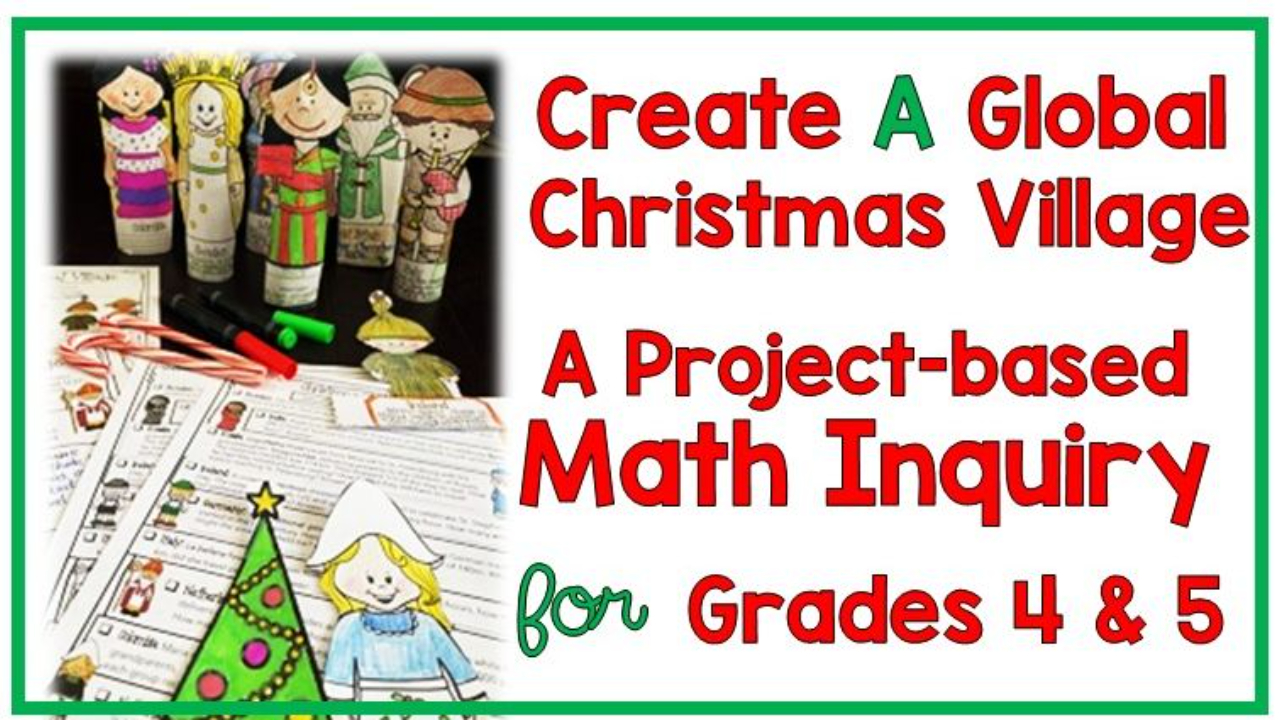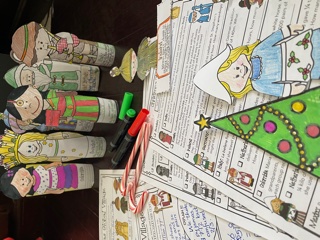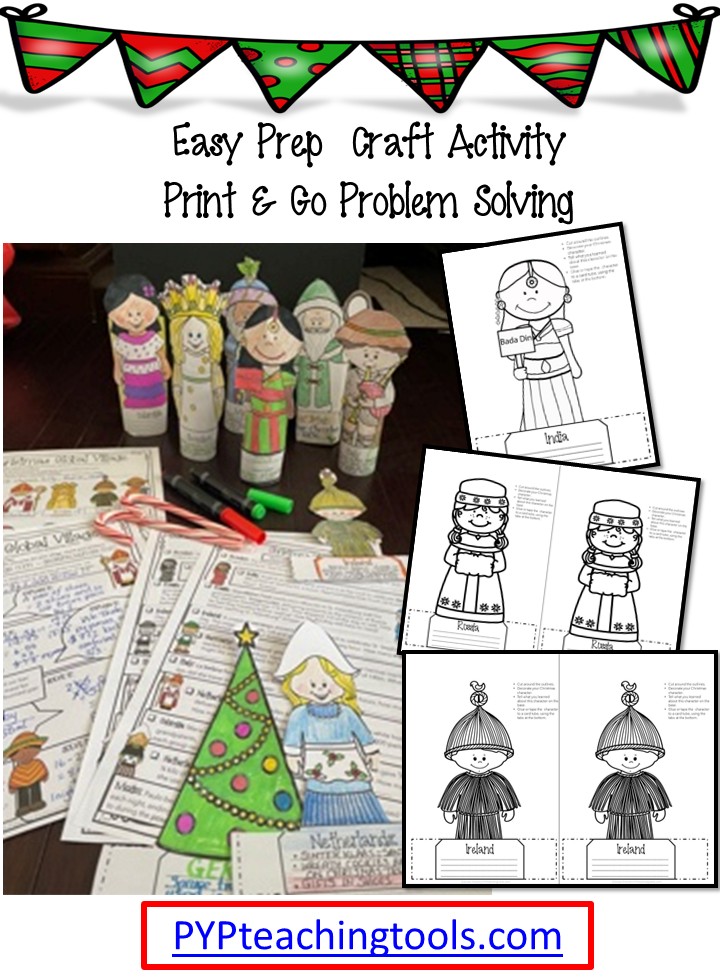Welcome to PYPteachingtools.com
The Global Christmas Village: A Project-Based Math Inquiry for Upper Elementary Students

Challenge your upper elementary students with this inquiry-based math project! The Global Christmas Village engages Grades 4–5 learners in real-world problem solving with number sense, measure and design thinking using festive, global themes.
Transform Math into a Real-World Inquiry
In my Grade 4/5 classroom, the Global Christmas Village Math Inquiry became a highlight of our pre-holiday weeks. What began as a set of differentiated problem-solving sheets evolved into a bustling global village of characters, traditions, and beautifully measured designs all imagined, calculated, and constructed by the students themselves.
This project turned abstract math concepts into something tangible. My students weren’t just solving word problems; they were earning their way into creating a global Christmas village filled with characters and celebrations from around the world.
What the Project Involves
The goal of the activity is to collaboratively create a global village of Christmas tradi...
10 Easy Assessment Strategies for Conceptual Understanding in the IB PYP

10 Easy Strategies for Assessing Conceptual Understanding in the IB PYP.
Helping students build conceptual understanding is at the core of how we approach knowledge in the IB PYP. But how do we ensure they’re truly grasping big ideas rather than just recalling facts? I've put together 10 simple, effective ways to check for conceptual understanding at different grade levels ( supporting differentiation and diverse learning styles)—whilst encouraging student agency. Plus, you’ll find links to several resources that I designed for my class to support their self-assessment and reflective thinking practice.
Look for the IB PYP This or That Exit Slips and Reflection Task Cards for Concepts to support deeper thinking across all transdisciplinary  themes. They were such a hit for students and teachers!
themes. They were such a hit for students and teachers!
For Your Lower Grades Learners
-
Concept Sorting with Real Objects
This is an example of internalisation & classification in action.
Provide a variety of real-world objects and have s...
Unpacking Project Based Learning in the IB PYP

Unpacking Project-Based Learning for the IB PYP: A Concept-Based, Transdisciplinary Approach
Consider all the benefits of experiential learning and the myriad ways it reaches ALL learners and learning styles. This is why I love authentic inquiry-based projects for ALL disciplines and project-based learning (PBL) is just another powerful way to engage students in the inquiry cycle, enhancing their research skills and connecting their learning to real-world issues. In the IB PYP, inquiry-based math projects offer powerful opportunities for students to explore math in a way that connects to real-world issues Let’s look at how the PBL approach can be adapted for the IB PYP classroom within our concept-based, transdisciplinary approach to teaching.
I have provided several examples for both upper and lower grades. Read on to find high-engagement ideas for your students' age and ability level.

Why Project Based Inquiry?
I create inquiry-based projects and activities for my students b...
Spook-tacular Halloween Literacy Activities for Upper Elementary: Supporting IB PYP ATL Skills

There isn't much as scary as Halloween in the elementary classroom! You either love it or hate it! 🎃 Whatever your feelings about Halloween, brace yourself and keep the inquiry flowing with these skills-based learning tools I have for you. And all perfectly aligned for your upper elementary IB PYP classroom.
Thinking & Communication Skills through Literacy
Halloween is the perfect time to bring a little magic to your classroom and engage students with creative, spooky literacy activities. By integrating Halloween-themed tasks into your learning environment, you can provide meaningful experiences that foster critical Approaches to Learning (ATL) skills, such as thinking, communication and social skills; key elements of our IB PYP framework. Below, we explore some eerie-sistible 🎃Halloween literacy activities that will make your planning easier.
1.Spooky Story Starters for Creative Writing _Thinking & Communication Skills
Get your students’ imaginations howling with a Halloween-the...
Project Based Learning in the IB PYP Inquiry


I've shared a lot about project based learning with our Instagram IB PYP community and how it fits into our student-led inquiry framework. Many have asked me if it offers fidelity to the inquiry process, to student agency and to transdisciplinary learning. With this post, my intention is to share my perspective based on my experience and hopefully bring some clarity as to how project based learning fits seamlessly within the unit of inquiry.
There is a common misconception that PBL is not as rigorous or as organic a form of inquiry-based learning. I say, that depends on:
- *Our understanding of an inquiry-based project
- *How we implement the process
- *How we differentiate inquiry
- *How we support student's voice within the project
- *How flexible we are with plans
- *How open we are to multiple strategies
- *How we view structure in the learning environment
View this post on Instagram
Before w...
Supporting A Collaborative Classroom in the IB PYP

The very nature of the student led, inquiry based classroom is to amplify the children's voice and bring their thinking to light. As part of 21st century skills, we know that collaboration is a key player in this development of learning. There is no doubt that the process of learning through collaboration is the evolution of expanding understanding. It breaks away from that traditional " I" and "me" method of learning and brings forth the community mindset. We want to build up this sense of collective agency through our culture of community learning.
Why Collaborative Learning?
This form of learning enables a multitude of sub-skills and ALL of the IB PYP Approaches to Learning Skills. It brings meaningful experiences to learning and allows our students to work towards a higher level of thinking as they build upon each others' thoughts and ideas.
- Social skills: Becoming active participants of a social setting presents opportunities for the children to become more effective wit ...
Integrating Inquiry Based Math in the IB PYP

The Inquiry-Based Math Project in the IB PYP
Integrated maths inquiry, concept based maths, project based learning….it doesn’t matter what you call it, well designed projects support learning through a guided inquiry that has enough scope to ensure that maths concepts are approached authentically and with a student-led perspective. These projects naturally lend themselves to support all types and levels of learners. They are transdisciplinary in nature, allowing concepts and skills to be transferred and applied towards an end product that has largely been created with the children's voice as an obvious part of the process. They're open-ended enough to allow your students room to expand and direct the project yet structured enough to support those learners who aren’t quite ready to take that leap into independent inquiry. As you watch the following video, where I share my strategies together with Parvana Guliyeva (an IB PYP grade 4 teacher, currently in Portugal) consider our transd...
Integrating Math Authentically Into the IB PYP Inquiry

I’m delighted to have teamed up with PYP teacher, Parvana Guliyeva again, to share these strategies for integrating maths into the inquiry authentically. Parvana is currently teaching PYP4 at The International Sharing school in Lisbon, Portugal. You can reach her on Instagram @space_for_learning. Scroll down to watch the video below. You may remember Parvana from a previous collaboration when she shared her ideas for inclusive assessment and bringing a greater degree of AGENCY to our students with reflection & assessment. You can read more about assessment tools and strategies here and link to the video in this article.
And of course, if you are looking for a ready-to-go professional development workshop packed full of practical strategies for bringing agency into assessment for ALL age levels, take a look at my workshop package.
As you watch the following video, consider our transdisciplinary approach and how we plan to investigate through concepts and skills-based learni...
Teaching Time with An Inquiry Approach


If I’m to be honest, teaching elapsed time is not my favourite thing to do. It’s pretty close to pulling my own teeth, but of course, ultimately, far more rewarding. With interactive timelines things get far more interesting.

With 3rd grade, it is such a tricky concept to grasp, particularly with hours and minutes. And then when you throw in years and A.D and B.C ( now also known as Before the Common Era /B.C.E and the Common Era/ C.E) , we can really end up quite tied in knots. But once they’ve got it, by golly, the wee angels are soaring! And their teacher is on cloud nine with them!
The review, by the time we get to 4th and 5th grades, isn’t quite as painful, thank goodness, and fine tuning those time lines and introducing more complex variations can even become a fun experience for all involved with great digital variations that the kids love exploring. I’ll get to more of those in a bit.
There are numerous ways to teach elapsed time and I wanted to share a few favourites...
Brilliant Picture Books for Integrating Maths in the IB PYP

I’m an avid believer in making maths an adventure of discovery and creation rather than simply an expected chore. By integrating maths into our units of inquiry and making it an authentic experience, we are dispelling the myth that maths is boring and we turn our learners into investigators, truth seekers and explorers! Far more exciting already, don’t you think?
I’m well aware of how tricky it can be to integrate maths into all of our units of inquiry and so there are several alternative routes that I turn to when the going gets tough, which I’ll be sharing soon in a future post. But for today, I want to share how picture books are one of the easiest ways to bring the adventure back to your maths lessons.
Here are some of my favourites that I’ve found provoke inquiry and are simple to slot into multiple units of inquiry, whilst covering many maths standards. Many of them are flexible enough to adapt for all ages. You can link directly to each book for more information by clicking ...





